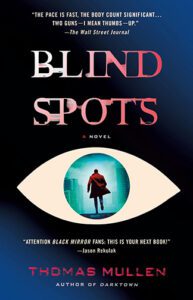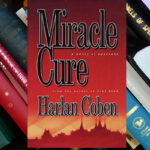Home »

Thomas Mullen has a lot to say in Blind Spots
Book Review
By Derryll White
Mullen, Thomas (2023). Blind Spots.
 “Trust is something you don’t think about. When it exists, it’s invisible.” – Thomas Mullen
“Trust is something you don’t think about. When it exists, it’s invisible.” – Thomas Mullen
As a writer Thomas Mullen often walks new and undiscovered pathways. In ‘Darktown’ he revealed basic racism hidden deep within the U.S. system of laws. Here, in ‘Blind Spots,’ he focuses on several puzzling social issues. What is an artist? How do we put our cognitive world together? What happens as our body ages and senses fail?
Mullen takes the reader through these questions steadfastly, methodically, revealing everything. A crime novel? This writer blows the genre apart reminiscent of Inspector Jacques Clouseau’s assault on Hollywood.
This novel is set in the immediate future. There are a lot of questions raised for our time – right now. What happens when a corporation gets a death-grip on world control (reference Elon Musk)? Do Putin and Trump disappear, or do they manifest as even more malevolent beings? Who are we when we begin to disassociate from our own memory? That’s a hard one as the reader inexorably ages. We do change as we age.
Mullen says we run out of people as we get older (true) and we have to work harder at being positive.
Thomas Mullen has a lot to say. The inquiring reader is left with a lot to think about.
********
Excerpts from the novel:
 POLICEWOMAN – She had been warned when she started: the job makes you absorb everyone’s anger, everyone’s sadness. The warnings had failed to dissuade her. This has been the only job she’s ever thought about, for years. Twenty-six years old now, four years in. No matter what the veterans at the academy threw at her, she was ready. Growing up, she hadn’t thought about being a cop; then came the moment, during the early days of The Blinding, when a tough female officer promised to find Amira’s brother, Dante. Despite barely being able to see herself, despite the chaos in the streets, the cop told Amira’s family she’d find him.
POLICEWOMAN – She had been warned when she started: the job makes you absorb everyone’s anger, everyone’s sadness. The warnings had failed to dissuade her. This has been the only job she’s ever thought about, for years. Twenty-six years old now, four years in. No matter what the veterans at the academy threw at her, she was ready. Growing up, she hadn’t thought about being a cop; then came the moment, during the early days of The Blinding, when a tough female officer promised to find Amira’s brother, Dante. Despite barely being able to see herself, despite the chaos in the streets, the cop told Amira’s family she’d find him.
ARTIST – All those arguments and debates. The many times he coaxed Jeanie back from the cliff, metaphorically. Telling her she was overthinking things, that yes, it was still possible to create art in a world where everyone sees with machines. Then her replying that overthinking is precisely what artists do, they overthink and overfeel, it’s like they have amplifiers hooked up to all their nerves, and sometimes this just felt so wrong, she feared she couldn’t tolerate it anymore.
THE FUTURE – And the Holy Grail (or the atom bomb), the dream (or nightmare) of everyone, the ability to permanently and seamlessly fuse machine learning, the Internet, and heightened processing speeds to the human brain. The so-called Singularity. If science has found a way to beam visual data straight into our cerebral cortex, then implanting all sorts of other data – and, eventually, every fact known to humankind – shouldn’t be that far off.
AGEING – We change as we age, and those past versions of ourselves are shed as we make our way through life. Or they’re scraped off by hardships we never saw coming. What’s left underneath becomes our new skin, our new self. Parts that we once tried to hide, parts we were afraid to let out.
VISION – That’s vision, he realizes, the ability to coast through the world without truly experiencing it. The assumption that you have mastered a realm that’s so much more complex than you have dared to imagine.
REMEMBERING – And maybe because of how disquieting the thought was, the incredible fallibility of our vision, and therefore of our memories. Something happens, but then it’s gone. If you want it back, we say that you are remembering it, but really you’re daydreaming it. You are taking an historical event, something that once occurred in the real world, and wrapping it in the gauzy haze of fiction. The next time you remember it, you are wrapping another layer of fiction around it, impressing your imaginings upon its delicate surface. Convincing yourself that it’s real, being so sure of yourself that you will one day swear to the veracity on the stand, before a judge and a Bible and the laws of this nation.
Even though you’ll be wrong.
INEQUALITIES – “Today’s inequalities didn’t come from The Blinding – they were already entrenched. Constant wars, rampant poverty, racism and sectarianism dividing society into smaller and smaller groups that the elite could control. Environmental catastrophe, even before all The Blinding’s fires.” She pauses. “Restoring vision, even if it were possible, would only reset us on that awful path. But we believe there is a better way.”
 – Derryll White once wrote books but now chooses to read and write about them. When not reading he writes history for the web at www.basininstitute.org.
– Derryll White once wrote books but now chooses to read and write about them. When not reading he writes history for the web at www.basininstitute.org.







